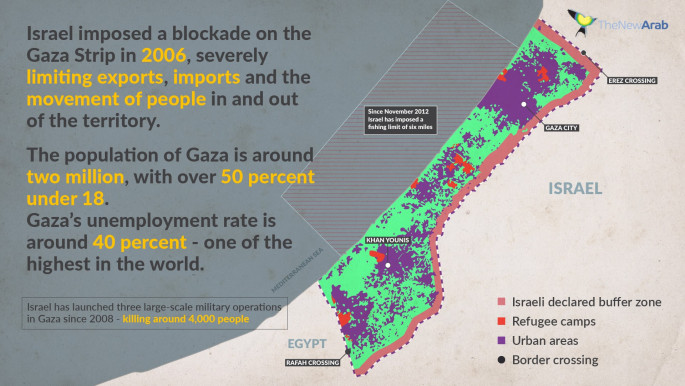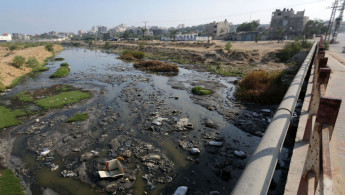Follow us on Facebook, Twitter and Instagram to stay connected
Israel hit by sewage deluge after cutting fuel supplies to Gaza's treatment plant
Treatment plants in Gaza are unable to operate after Israel cut fuel supplies to the strip.
2 min read
The sewage outflow could escalate into a bigger ecological disaster [Getty]
Gaza's sewage treatment plant can no longer operate, the strip's mayor Yahya Al-Sarraj said on Monday, after Israeli reports warned the overflowing sewage had spilled across the border.
Israel restricted Gaza's access to fuel imports that are needed to power the treatment plant earlier this month, after arson balloons sent from Gaza sparked fires in southern Israel escalating tensions.
Israeli officials alleged that the sewage outflow was a deliberate act by Hamas, the Palestinian millitant and political movement that controls Gaza.
Palestinian media reports said that residents of the besieged territory were also suffering from untreated wastewater.
Residents near the inactive treatment facility have been forced to keep windows closed to keep out putrid smells and potentially hazardous musquitoes, the reports said.
It is feared that the wastewater could also reach homes if pumps that control the sewage's flow cease to operate.
The ecological disaster in the Gaza Strip, which Palestinians say is the result of Israel's blockade, could also impact Israel.
Israeli officials fear that if sewage facilities in Gaza do not resume operations the situation will deteriorate further and more sewage will flow across the borders.
"Collective punishment of our neighbours stinks - for us too," one Jerusalem-based twitter user wrote.
Read also: Israel blocks $30 million Qatari aid to Gaza
The latest attack follows a week of heightened Israeli aggression against Gaza, during which
Israel has closed the Karem Abu Salem goods crossing with Gaza following a week of heightened tensions and has bombed the besieged strip on an almost daily basis since 6 August.
Gaza's coastal fishing zone has also been restricted preventing food-deprived Gazans from accessing their own waters.
Ongoing violence against Gaza
Israel restricted Gaza's access to fuel imports that are needed to power the treatment plant earlier this month, after arson balloons sent from Gaza sparked fires in southern Israel escalating tensions.
Israeli officials alleged that the sewage outflow was a deliberate act by Hamas, the Palestinian millitant and political movement that controls Gaza.
Palestinian media reports said that residents of the besieged territory were also suffering from untreated wastewater.
Residents near the inactive treatment facility have been forced to keep windows closed to keep out putrid smells and potentially hazardous musquitoes, the reports said.
It is feared that the wastewater could also reach homes if pumps that control the sewage's flow cease to operate.
The ecological disaster in the Gaza Strip, which Palestinians say is the result of Israel's blockade, could also impact Israel.
|
"Collective punishment of our neighbours stinks - for us too," one Jerusalem-based twitter user wrote.
Read also: Israel blocks $30 million Qatari aid to Gaza
The latest attack follows a week of heightened Israeli aggression against Gaza, during which
Israel has closed the Karem Abu Salem goods crossing with Gaza following a week of heightened tensions and has bombed the besieged strip on an almost daily basis since 6 August.
Gaza's coastal fishing zone has also been restricted preventing food-deprived Gazans from accessing their own waters.
Ongoing violence against Gaza
In 2006, Israel imposed a land, sea and air blockade on the strip, effectively turning the coastal enclave into an open-air prison, where the entry of all basic necessities - such as food, fuel and medicines - is controlled by Israel.
Israel insists its blockade is necessary to isolate Hamas, with which it has fought three wars since 2008.
Critics say the blockade, along with periodic bombardment of Gaza amounts to collective punishment of the coastal enclave's 2 million residents.
Nearly 70 percent of Gaza's population is food insecure and around 80 percent of Palestinians in the impoverished enclave are reliant on international aid, according to the United Nations.





 Follow the Middle East's top stories in English at The New Arab on Google News
Follow the Middle East's top stories in English at The New Arab on Google News


